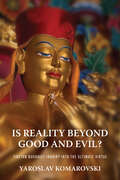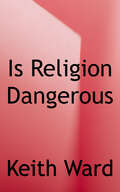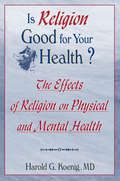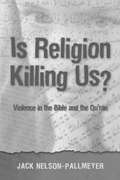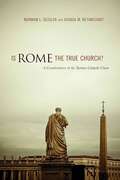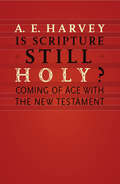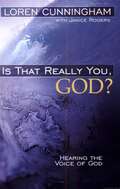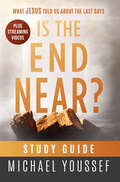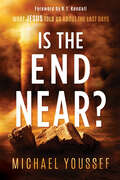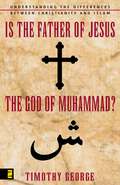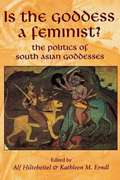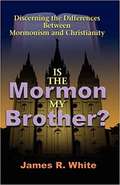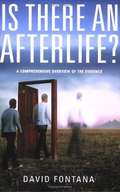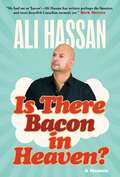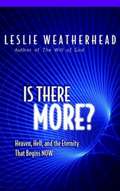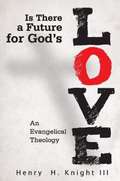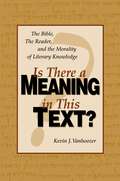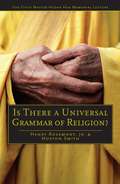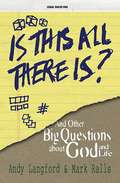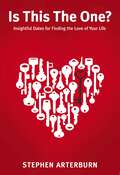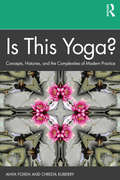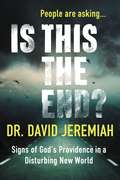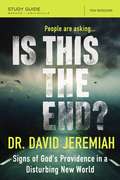- Table View
- List View
Is Reality beyond Good and Evil?: Tibetan Buddhist Inquiry into the Ultimate Virtue (Traditions and Transformations in Tibetan Buddhism)
by Yaroslav KomarovskiIlluminates the debate on the nature of virtue and ultimate reality Tibetan Buddhist thinkers agree that, on the most fundamental level, our nature is pure. What exactly that ultimate nature is, however, remains the subject of debate. Yaroslav Komarovski&’s new book appraises how divergent understandings of the ultimate nature by Tibetan thinkers, including ideas informed by two conflicting yet complementary systems of Buddhist thought—Yogācāra and Madhyamaka—affect their diverse approaches to understanding virtue, and how their understandings of virtue in turn relate to their approaches to the Buddhist thought and practice. Tracing the origins of the polemics on ultimate virtue back to the Indian texts and writings of early Tibetan thinkers, Komarovski focuses chiefly on the works of the two seminal thinkers of the Sakya tradition of Tibetan Buddhism, Serdok Penchen Shakya Chokden (1428–1507) and Gowo Rapjampa Sönam Senggé (1429–1489), and offers both a learned summary of a historical controversy and a modern commentary on this vital debate.
Is Religion Dangerous?
by Keith WardMany commentators today claim that religion is dangerous and harmful. In addressing this question, Keith Ward begins by defining what religion actually is and how most human harm has been caused. He then looks at why people say that religion is dangerous, focusing particularly on religious wars and conflicts and on specific attacks on religion, such as the claims that God is wrathful, that religion is intolerant, that religious morality is primitive and cruel. <p><p>Keith Ward argues that religion produces great good - for example, in terms of hospitals, the abolition of slavery, great art and music, moral heroism, and philosophy and science. Religion, he concludes, is the best rational basis for morality.
Is Religion Good for Your Health?: The Effects of Religion on Physical and Mental Health
by Harold G KoenigIs Religion Good for Your Health? takes you deep into the heart of the ageless debate on the importance of religion and faith to physical and mental health. On the one hand, you will learn about important research findings from cross-sectional, longitudinal, and intervention studies that have demonstrated positive effects of religious belief on both mental and physical health. On the other hand, you will learn how the vast clinical experiences of leading health experts suggest that religion can have negative effects on health. Integral to the book’s exploration of the relationship between health and religion are the trends that have occurred in society over the last century. You will learn about significant demographic changes, changes in health and health care, and shifts in values, attitudes, and religious conviction, all of which have direct implications for health care providers, the clergy, the “baby boomers,” and older adults. From Author Harold Koenig, a leading expert on religion and health who has frequently been interviewed by major broadcasting networks such as ABC, National Public Radio, the British Broadcasting Corporation, NBC, CBS, and “Ivanhoe Broadcast News,” you will also learn about: pathological uses of religion the need for cooperation and collaboration between health and religious professionals studies on the relationship of religious beliefs and practice to physical conditions such as blood pressure, heart disease, stroke, and cancer links between religious behavior and depression, anxiety, and drug use the waning of religion’s influence in America first-hand accounts from patients who have faced painful and/or life-threatening illnessAs Is Religion Good for Your Health? analyzes the pathological aspects of religion, you will begin to understand how religious beliefs have the capacity to strongly influence people’s lives and their health, whether positively or negatively. Health care providers, public policy experts, religious professionals, medical researchers, and medical students will find the book’s overview of the issues at stake, particularly the implications for our public health care system, crucial to the advancement of health care practice into the next century.
Is Religion Killing Us?: Violence in the Bible and the Quran
by Jack Nelson-PallmeyerNelson-Pallmeyer explores the ways in which the sacred texts of Christianity, Judaism, and Islam seemingly justify violence against enemies in the service of God's will. He challenges the understanding of power that lies at the heart of the Bible and the Quran, arguing that nonviolence is crucial to the future of humanity and that the abusive visions of power presented in sacred texts should be challenged.
Is Rome the True Church?: A Consideration of the Roman Catholic Claim
by Norman L. Geisler Joshua M. BetancourtA major critical analysis of the Roman Catholic Church's exclusive claim of infallibility. In 2007 the president of the Evangelical Theological Society converted to Roman Catholicism. His conversion and subsequent resignation stirred up questions that always swirl around such high-profile conversions: Why do some Protestants become Catholics? Is Roman Catholicism a false church? Which church is the true church? Norman Geisler and Joshua Betancourt answer these questions in Is Rome the True Church?, a major critical analysis of the Roman church's claim to being the only true church. Since this claim is the most fundamental of all Catholic dogmas-all other doctrines being based on it-the whole of the Roman system stands or falls here. The authors explain and critique the Roman church's biblical, historical, theological, and philosophical arguments on behalf of its claim, digging into the best primary and secondary Catholic sources on the subject. This book has answers for students, thoughtful evangelicals, and anyone interested in Roman Catholicism.
Is Scripture Still Holy?: Coming of Age with the New Testament
by A. E. HarveyIn this volume A. E. Harvey asks, Is the notion of "Holy Scripture" still credible? In particular, in the light of modern critical study and postmodern literary theory, does the New Testament still qualify as a "holy" book? Arguing that the New Testament must continually subject its credentials to examination for historical reliability, internal consistency, and general plausibility, Harvey tests the Bible's historical credibility and plausibility in seven concise chapters. In dialogue with historical criticism, he compares the New Testament to other ancient documents, examines its presentation of Jesus, and considers the New Testament's validity as a moral guide in the twenty-first century. Harvey's careful examination leads him to conclude that a good case can still be made for the New Testament's authority and "holiness," subject to continual reassessment in the light of further advances in understanding and criticism.
Is That Really You, God?: Hearing the Voice of God
by Loren Cunningham Janice RogersThis practical guide to hearing God's voice shows how an ordinary man who was committed to hearing God and obeying Him became the founder of the largest interdenominational missions organization in the world. <p><p> Loren Cunningham's dream began with a vision - waves of young people moving out across the continents announcing the Good News of Jesus Christ to the whole earth. Decades later, Loren's vision has grown into an interdenominational movement of Christians from around the world who are dedicated to presenting the Gospel to this generation. <p><p> How did God move Loren's dream from vision to reality? He led Loren and his wife, Darlene, through a series of tough lessons in guidance. The exciting story of Youth With A Mission has much to teach us about the art of listening to God as we seek to be used by Him. Is That Really You, God? is not only a practical guide to hearing God's voice, but also an amazing testimony to how following His direction can impact our lives and our world for the glory of God's kingdom. <p><p> International statesman and conference speaker Loren Cunningham and his wife, Darlene, are the founders of Youth With A Mission. They currently live at the YWAM University of the Nations center in Kona, Hawaii. Loren speaks and teaches internationally. His extensive missionary travels have taken him to every country on earth. Pages: 203 (paperback)
Is The End Near? Study Guide
by Michael YoussefWhat will be the sign of the end of the age? After using this study guide, your understanding of the end times according to Matthew chapters 24 and 25 will be expanded so you can see Jesus&’s words from a new light. Jesus gave His longest answer to this question on the Mount of Olives. Join Dr. Michael Youssef as he takes a deep dive into the words of Matthew 24 and 25 in the sessions of this companion to Is the End Near? Intended as a four-week Bible experience, the Is the End Near? video series and study guide are designed for group settings, including small groups or Sunday school classes, as well as for individual study. Each weekly session begins with a reflective question, followed by the video message that viewers can either stream or watch on DVD. The sessions are fully adaptable to the format and flow of activities based on the size and structure of the group or to accommodate personal study. Each day&’s session guides readers through:A scripture reading, followed by reflection questions, to help readers mine the material surveyed during the weekly sessionA review of the key verse to memorizeA time of prayerFEATURES AND BENEFITS:each week includes five daily sessions of verse-by-verse study;followed by a sixth day to reflect on the material;as readers work through this study, they will become astute in Matthew chapters 24 and 25 and develop a deeper understanding of what Jesus&’ words hold for the future!
Is The End Near?: What Jesus Told Us About the Last Days
by Michael YoussefWhen will the insanity end? This book will answer your questions about end times issues by examining statements that Jesus Himself made about what was to come. You will be encouraged as you anticipate Christ&’s return. Both inside and outside the church, people are asking the same question: Is this the end of the world? With a global pandemic that has killed millions; nations spending millions of dollars to update their nuclear weapons arsenals; and an increase in fire, floods, plagues, and other natural disasters, Christians and non-Christians alike are concluding that history appears to be drawing to a close.Yet Dr. Michael Youssef says now is not the time to fear. In Is The End Near? Dr. Youssef looks at Jesus&’ words in Matthew 24 and 25 about the end of civilization and the coming of the one world ruler and examines: Whether the &“birth pains&” Jesus predicted in Matthew 24 are signs that the end times are nearEvidence for potentially apocalyptic events such as asteroid or comet collisions with earth—events that could trigger unprecedented tsunamis and global darknessWhether it&’s possible for Christians to be deceived by the Antichrist and other false messiahs in the end timesThe four dimensions of the coming judgmentHow to live in the hope and security of the Lord&’s return, even as the world is collapsing around us As believers, we don&’t have to fear the end. Using God&’s Word as our guide, we can look toward the future with hope, because we know the One who holds the future in His hands.FOREWORD BY R. T. KENDALL
Is The Father Of Jesus The God Of Muhammad?: Understanding the Differences between Christianity and Islam
by Timothy GeorgeThe days when western Christians could ignore the influence of Islam are over. Today as never before, the world's second largest religion is shaping our culture, and words such as jihad, imam, Quran, and fatwa have entered our vocabulary. While all Mus
Is The Goddess a Feminist? The Politics of South Asian Goddesses
by Alf Hiltebeitel Kathleen M. ErndlIn India, God can be female. The goddesses of Hinduism and Buddhism represent the largest extant collection of living goddesses anywhere on the planet. Feminists in the West often draw upon South Asian goddesses as theological resources in the contemporary rediscovery of the Goddess. Yet, these goddesses are products of a male supremacist society. What is the impact of powerful female deities--their images, projections, textuality, and history--on the social standing and psychological health of women? Do they empower women, or serve the interests of patriarchal culture? Is the Goddess a Feminist? looks at the goddesses of South Asia to address these questions directly. Not a book about a single goddess or even about a variety of South Asian goddesses, the volume raises questions about images of deities as symbols and the ways in which they function. Contributors discuss contemporary Indian women who have embraced goddesses as spiritually and socially liberating, as well as the seeming contradictions between the power of Indian goddesses and the lives of Indian women. They also explore such topics as the element of male desire in the embodiment of female deities, the question of who speaks for the goddesses, and the politics and theology of Western feminist use of Hindu and Buddhist goddesses as models for their feminist reflections.
Is The Mormon My Brother?
by James R. White"The is one of the most illuminating updates on the current state of Mormonism that I have ever seen. It brings Mormonism's unstable, changeable truth clearly into view, and provides a convincing warning against the most polytheistic religion ever offered to the modern world." - Dr. Gleason Archer, Professor of Old Testament and Semitics at Trinity Evangelical Divinity School
Is The New Testament Reliable?: A Look at The Historical Evidence
by Paul BarnettEvangelical examination of the historical evidence supporting the truth of Christ
Is There An Afterlife? A Comprehensive Overview of the Evidence
by David FontanaA detailed overview for the evidence for the existence of spirits and the afterlife.
Is There Bacon in Heaven?: A Memoir
by Ali HassanFor fans of Russell Peters, Trevor Noah, and Mark Critch comes a hilarious debut memoir about family, pursuing our passions, and figuring out who we are, by stand-up comedian and popular CBC host, Ali Hassan.Growing up, Ali Hassan was a chameleon. His friends came from many different backgrounds and religions—Trinidadian, Parsi, Goan, Hindu, Christian, Sikh. And as a hockey-playing, Crock-Pot–using young man who also knew the words to at least ten Blue Rodeo songs, he could blend in everywhere. But the world has a funny way of reminding you who you are, and Hassan&’s Muslim Pakistani family and community did, too. In this heartfelt and funny memoir, based on his hit stand-up comedy, Hassan shares his lifelong journey to becoming a &“cultural Muslim&”—learning to walk the line of embracing his heritage while following his passions and being true to himself. From failing to learn Arabic—or much of anything—in Sunday school and visiting family in Pakistan who mocked him relentlessly, to discovering the wonders of pepperoni as a teenager and being a celebrity judge at Ribfest, he finds himself in compromising situations that challenge his beliefs and identity. Now, as a father of four, he has to answer his children&’s questions and try to explain his point of view. But he can&’t just &“give them&” an identity as a cultural Muslim. Sharing his story is the next best thing. With the perfect blend of humour and insight, Is There Bacon in Heaven? explores the deep need to belong that exists in everyone.
Is There More?: Heaven, Hell, and the Eternal Life that Begins Now
by Leslie D. Weatherhead A. Kingsley WeatherheadThink you know everything there is to know about the life that lies beyond this one? Think again. Questions about life beyond death are always with us. In this classic volume, Leslie Weatherhead answers personal and important questions about heaven, hell, and the future God has in store for us."Eternal life is . . . a quality and not just a quantity; . . . a quality of communion with God that clearly begins now. You know, people talk about the afterlife and they say, ‘He’s gone to be with God.’ But he has always been with God, and the highest heaven doesn’t mean that God exists in any fuller measure. It can only mean that our power of communion deepens. But one of the marvelous things about the Christian gospel is that the offer of eternal life is here and now." –from chapter 1Check out other resources by Dr. Weatherhead, including The Will of God, in the Related Products Section below.
Is There a Creator Who Cares About You?
by Watch Tower Bible Tract Society of PennsylvaniaDiscusses the possibility that the universe and life on Earth were created by a loving God. Examines the evidence from a scientific point of view, and compares what science has found with the Bible.
Is There a Future for God's Love?: An Evangelical Theology
by Henry H. Knight IIIIn Is There a Future for God's Love? Henry H. Knight III explains how evangelical theology’s historic commitment to revealed truth can still function in a world that is averse to truth claims and allergic to all forms of authority. Yet in addition to revealed truth, evangelicalism has always insisted on a direct, personal encounter with God in Christ and on personal involvement in God’s mission to redeem the world. How does evangelical Christianity’s understanding of a loving God life fit in a world suspicious of any claim to a normative encounter with the divine? How can one answer the call to love and serve in God's name when all such calls are viewed inherently intolerant? In this book Knight wrestles with these and other questions of how evangelical Christians can prayerfully discern while also contextualizing the gospel in order to live with faithful effectiveness while avoiding unfaithful compromise.
Is There a Meaning in This Text?: The Bible, the Reader, and the Morality of Literary Knowledge
by Craig L. Blomberg Kevin J. VanhoozerIs there a meaning in the Bible, or is meaning rather a matter of who is reading or of how one reads? Does Christian doctrine have anything to contribute to debates about interpretation, literary theory, and post modernity? These are questions of crucial importance for contemporary biblical studies and theology alike. Kevin Vanhoozer contends that the postmodern crisis in hermeneutics—”incredulity towards meaning,” a deep–set skepticism concerning the possibility of correct interpretation—is fundamentally a crisis in theology provoked by an inadequate view of God and by the announcement of God’s “death.” Part 1 examines the ways in which deconstruction and radical reader–response criticism “undo” the traditional concepts of author, text, and reading. Dr. Vanhoozer engages critically with the work of Derrida, Rorty, and Fish, among others, and demonstrates the detrimental influence of the postmodern “suspicion of hermeneutics” on biblical studies. In Part 2, Dr. Vanhoozer defends the concept of the author and the possibility of literary knowledge by drawing on the resources of Christian doctrine and by viewing meaning in terms of communicative action. He argues that there is a meaning in the text, that it can be known with relative adequacy, and that readers have a responsibility to do so by cultivating “interpretive virtues.” Successive chapters build on Trinitarian theology and speech act philosophy in order to treat the metaphysics, methodology, and morals of interpretation. From a Christian perspective, meaning and interpretation are ultimately grounded in God’s own communicative action in creation, in the canon, and preeminently in Christ. Prominent features in Part 2 include a new account of the author’s intention and of the literal sense, the reclaiming of the distinction between meaning and significance in terms of Word and Spirit, and the image of the reader as a disciple–martyr, whose vocation is to witness to something other than oneself. Is There a Meaning in This Text? guides the student toward greater confidence in the authority, clarity, and relevance of Scripture, and a well–reasoned expectation to understand accurately the message of the Bible. Is There a Meaning in This Text? is a comprehensive and creative analysis of current debates over biblical hermeneutics that draws on interdisciplinary resources, all coordinated by Christian theology. It makes a significant contribution to biblical interpretation that will be of interest to readers in a number of fields. The intention of the book is to revitalize and enlarge the concept of author–oriented interpretation and to restore confidence that readers of the Bible can reach understanding. The result is a major challenge to the central assumptions of postmodern biblical scholarship and a constructive alternative proposal—an Augustinian hermeneutic—that reinvigorates the notion of biblical authority and finds a new exegetical practice that recognizes the importance of both the reader’s situation and the literal sense.
Is There a Universal Grammar of Religion?
by Huston Smith Henry Rosemont Jr.In this provocative volume two important scholars of religion, Huston Smith and Henry Rosemont, Jr., put forth their viewpoints and share a probing conversation. Though the two diverge considerably in their accounts of religious faith and practice, they also agree on fundamental points. Huston Smith, author of the important work The World's Religions, has long argued for the fundamental equality of the world's religions. Describing a "universal grammar of religion," he argues that fourteen points of similarity exist among all of the major religious traditions and that these similarities indicate an innate psychological affinity for religion within the human spirit. As Noam Chomsky has argued that humans are hardwired to use language, Smith similarly argues that humans are hardwired for religious experience. In response, Rosemont explicates his humanistic vision of the world, in which the "homoversal" tendency to contemplate the infinite is part of our co-humanity that endures across time, space, language, and culture. Rosemont also elaborates upon Noam Chomsky's theory of universal grammar and its relevance to Smith's ideas about the similarities among religions. This insightful exploration of the most essential basis of religion provides a new direction for comparative-religion scholars everywhere.
Is This All There Is?
by Andy Langford Mark RallsIntroduces the most basic themes of Christianity and explores the most fundamental questions of religion With this book, readers can learn the primary tenets of Christianity as they move into a deeper life of faith. * An easy-to-follow discussion of basic questions about the Christian faith and life * Helps readers discover that by understanding faith, they can experience it more fully. * A source not only for those new to the Christian faith but also those wanting to explore their faith more deeply. The authors explore such questions as: How do we deal with emptiness in our lives? Who is Jesus and how can he help? What is salvation? Can we trust in God?
Is This The One?: Simple Dates for Finding the Love of Your Life
by Stephen ArterburnIn Is This the One?, Steve Arterburn—an award-winning author and the founder and chairman of New Life Ministries, the largest faith-based broadcast counseling and treatment ministry—has created a "how to" plan for happier, stronger marriages. He contends that living in a "no regrets" relationship can be as simple following this spiritually solid and personally drawn plan before the first "I do" is even spoken. Host of the number one Christian radio broadcast, New Life Live!, Arterburn draws a painfully personal portrait of the devastation divorce has on a family. Rather than aiming at marriages already in jeopardy, Arterburn focuses attention on the beginning of relationships—before the commitment, before the emotional investment, before the children. He prescribes three sets of ten carefully devised dates designed to help couples reveal their true colors and clarify whether or not they are a compatible match. This practical, personal, and positive plan can impact marriages—and ground the skyrocketing divorce rate—as no other book has. Is This the One? is a must read for engaged or dating couples, happy singles, concerned parents, and anyone who wants to make better decisions about who to marry and who to leave behind.
Is This Yoga?: Concepts, Histories, and the Complexities of Modern Practice
by Anya Foxen Christa KuberryThis book provides a rigorously researched, critically comparative introduction to yoga. Is This Yoga? Concepts, Histories, and the Complexities of Contemporary Practice recognizes the importance of contemporary understandings of yoga and, at the same time, provides historical context and complexity to modern and pre-modern definitions of yogic ideas and practices. Approaching yoga as a vast web of concepts, traditions, social interests, and embodied practices, it raises questions of knowledge, identity, and power across time and space, including the dynamics of "East" and "West." The text is divided into three main sections: thematic concepts; histories; and topics in modern practice. This accessible guide is essential reading for undergraduate students approaching the topic for the first time, as well as yoga teachers, teacher training programs, casual and devoted practitioners, and interested non-practitioners.
Is This the End? (with Bonus Content): Signs of God's Providence in a Disturbing New World
by David JeremiahThis eBook includes the full text of the book plus an additional chapter on Europe from Dr. Jeremiah's book What in the World Is Going On? that is not found in the print book! The world seems more fractured each day. People are asking, "Is this the End?" Never have the headlines been this jarring, the cultural changes this rapid, or the moral decay this pronounced. What on earth is happening? After each new occurrence, the most oft-heard questions are, "Will the world ever be the same again?" and "Where is God in all of this?" Over the last few decades, Dr. David Jeremiah has become one of the world's most sought-after Christian leaders on topics that deal with biblical application and modern culture. And few would dispute that the pace at which things are currently changing is unprecedented. The time has come to accept this new normal, Jeremiah says, and understand how God's hand is still at work on His eternal plan for mankind. No one can afford to ignore these warnings, but all can better understand the greater story and the role we each play in this changing world. From prophetic clues in Scripture to an understanding of the power of Christ in all believers, this book directs us on a clear path forward. The book is split into two sections, each covering items surrounding two important questions. Is This the End of America? and Is This the End of the World? Includes detailed chapters on: Terrorism ISIS and Radicalized Islam The New Russia The Bleeding of America's Borders The "Anything Goes" Society Polarization and Divisiveness The Coming of Christ and many more
Is This the End? Study Guide: Signs of God's Providence in a Disturbing New World
by David JeremiahWe have almost become immune to the reality of today's headlines: from terrorism to natural disasters to political upheavals to refugees to disease to nuclear threats to failing economies...and the list goes on. People are thinking and asking, "Is this the end?" Nobody can answer that question specifically. In fact, Jesus warned about setting dates for the end of the age. But this we can say: Never have so many world-level events developed so rapidly and with such catastrophic implications. These events bring to mind the apostle Paul's words about "birth pangs" before the end of the age. In Is This the End? Study Guide, Pastor David Jeremiah looks at ten major developments in America and the world that almost defy imagination. Just a few years ago, nobody could have imagined the things we hear about daily in the news. We need to understand these events: what they are, what the Bible says about them, and how we should respond as followers of Christ. Follow Dr. Jeremiah as he unfolds five developments in America and five developments on the international stage-all of which beg the question, "Is this the end?"
